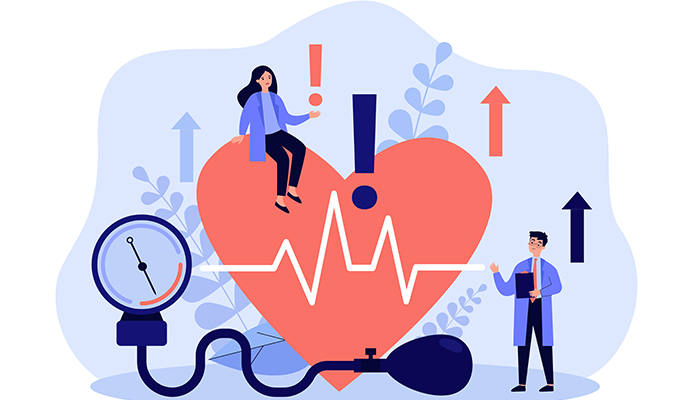Balancing stress and heart health: Cardiology care essentials
Balancing stress and heart health: Cardiology care essentials
Blog Article
Understanding the Relevance of Cardiology in Modern Health Care Providers
Cardiology plays an essential role in modern healthcare, particularly as cardiovascular disease continues to be the leading root cause of mortality worldwide. Breakthroughs in diagnostics and treatment have actually changed person treatment, allowing earlier treatments and enhanced end results. In addition, the change in the direction of precautionary cardiology equips individuals to handle their wellness proactively. As innovation remains to evolve, the integration of cutting-edge options may further redefine cardiology's influence on public wellness, triggering a more detailed exam of arising trends and their implications.
The Frequency of Cardiovascular Disease and Its Effect On Public Health
Although heart disease continues to be the leading cause of death around the world, its effect expands far beyond individual people to affect public wellness systems and economic climates. The high frequency of cardiovascular disease positions a considerable pressure on healthcare sources, requiring increased financing for treatment, avoidance, and rehab programs. Public wellness initiatives should resolve risk aspects such as obesity, cigarette smoking, and less active lifestyles, which contribute substantially to the rising incidence of heart conditions.Moreover, the economic worry connected with cardiovascular disease is tremendous, incorporating not only direct medical expenses yet also indirect expenses associated with lost efficiency and early death. Areas face challenges in handling these expenses, commonly bring about disparities in healthcare access and results. As the populace ages and lifestyle-related dangers remain to intensify, the seriousness for efficient cardiology treatments ends up being critical. Subsequently, attending to heart condition is not just an issue of private health and wellness however additionally an essential public wellness top priority.
Developments in Cardiac Diagnostics and Imaging Techniques
Current advancements in heart diagnostics and imaging strategies have actually transformed the field of cardiology, boosting the capacity to monitor and identify cardiovascular disease. Methods such as cardiac MRI, CT angiography, and echocardiography have actually ended up being increasingly innovative, offering comprehensive pictures of cardiac frameworks and functions. These modalities permit the early identification of problems like coronary artery disease, heart failing, and valvular disorders.Moreover, improvements in non-invasive diagnostics, such as wearable modern technology and remote monitoring tools, have encouraged individuals and healthcare carriers. These devices facilitate real-time monitoring of heart rhythms and various other important indicators, resulting in prompt interventions. In addition, expert system is being incorporated into imaging analysis, boosting accuracy and performance in diagnosis.
Advancements in Treatment Alternatives for Heart Conditions
Recent innovations in cardiology have caused significant advancements in therapy choices for heart disease. These include sophisticated medical strategies that enhance step-by-step end results and emerging medicines that supply new opportunities for treatment. As the area evolves, these developments play an essential role in enhancing person treatment and outcomes.
Advanced Surgical Techniques
Developments in medical methods have actually changed the landscape of cardiology, offering brand-new wish for clients with heart disease. Minimally intrusive procedures, such as catheter-based interventions, have actually greatly minimized recuperation times and hospital stays. Methods like robotic-assisted surgical treatment boost precision, allowing cosmetic surgeons to navigate complex anatomical structures with greater precision. Innovations in imaging technology facilitate real-time visualization throughout treatments, boosting results. Transcatheter aortic valve replacement (TAVR) exemplifies an advancement in treating aortic stenosis, enabling shutoff substitute without open-heart surgical treatment. Additionally, hybrid approaches that incorporate catheter-based and surgical methods provide customized options for different cardiac concerns. These sophisticated medical methods not only boost individual security but additionally broaden treatment alternatives, emphasizing the important function of innovation in modern-day cardiology methods.
Emerging Medications and Treatments
As the landscape of cardiology remains to evolve, arising treatments and medications play a crucial function in enhancing therapy options for heart problems. Developments such as unique anticoagulants and progressed lipid-lowering agents have actually transformed the administration of heart diseases, greatly lowering client morbidity and mortality. Furthermore, the development of gene therapies and regenerative medication provides promising avenues for dealing with problems formerly considered permanent. Scientific tests are continuously exposing the efficacy of these therapies, pushing the borders of conventional therapies. Additionally, the combination of electronic wellness technologies assists in personalized medicine, permitting customized therapy strategies based on genetic and way of living factors. Collectively, these improvements emphasize the vibrant nature of cardiology, boosting person outcomes and redefining requirements of treatment in modern-day medical care.
The Duty of Preventive Cardiology in Person Treatment
Preventative cardiology plays an important role in individual treatment by concentrating on the recognition of danger aspects that add to cardiovascular disease. With way of living alteration strategies and very early discovery strategies, doctor can efficiently decrease the occurrence of cardio occasions - Dr Garcia. This proactive strategy not just enhances client end results yet likewise promotes long-term wellness
Threat Aspect Identification
While cardiovascular illness stay a leading root cause of morbidity and mortality worldwide, reliable danger factor recognition works as a cornerstone of precautionary cardiology. Identifying threat aspects such as hypertension, hyperlipidemia, household, and diabetes history is essential for very early intervention. Healthcare specialists use various screening approaches to evaluate these factors, permitting tailored safety nets. Additionally, comprehending a patient's way of life options, such as cigarette smoking and physical inactivity, further notifies risk assessments. This detailed assessment makes it possible for clinicians to establish personalized care strategies aimed at mitigating dangers. By focusing on threat factor identification, health care systems can boost patient results and minimize the total concern of heart diseases, inevitably contributing to improved public health and wellness approaches and resource allotment.
Way Of Life Alteration Strategies
A wide range of research studies highlights the essential role of lifestyle adjustment methods in decreasing cardio condition threat. These approaches encompass dietary changes, increased exercise, cigarette smoking cessation, and weight like it monitoring. By taking on a heart-healthy diet regimen abundant in fruits, veggies, entire grains, and lean healthy proteins, people can lower cholesterol levels and high blood pressure. Normal physical activity strengthens the heart and improves overall cardio wellness. Additionally, giving up smoking cigarettes substantially lowers the threat of heart problem and improves healing rates for those with current conditions. Weight administration even more adds to cardio wellness by alleviating other risk elements such as diabetic issues and hypertension. Executing these lifestyle transforms not just promotes individual wellness however also functions as a keystone of precautionary cardiology in patient treatment.
Very Early Detection Methods
Lifestyle alterations considerably add to reducing cardio disease threats, however they are most effective when coupled with very early detection strategies. Precautionary cardiology emphasizes the relevance of identifying possible heart issues prior to they escalate right into serious problems. Techniques such as high blood pressure monitoring, cholesterol testing, and advanced imaging technologies like echocardiograms play critical roles in reviewing cardiovascular wellness. Biomarkers and genetic screening additionally enhance the precision of early discovery, enabling customized preventive methods. Normal cardiac danger examinations empower doctor to interfere proactively, possibly avoiding heart strikes and strokes (Cardiology Jupiter). By incorporating these early detection approaches right into routine care, individuals can take advantage of prompt lifestyle treatments and targeted therapies, ultimately improving results and boosting high quality of life
Integrating Innovation Into Cardiology Practices
As developments in innovation remain to improve numerous areas, the assimilation of innovative tools and systems into cardiology practices has actually ended up being crucial for enhancing patient care and outcomes. Telemedicine platforms permit cardiologists to keep track of patients remotely, improving access to care while reducing the burden on healthcare facilities. Wearable gadgets, such as smartwatches, enable continual heart rate monitoring, alerting both physicians and people to prospective problems in real-time. In addition, expert system (AI) is being utilized to analyze vast amounts of cardiac data, aiding in very early diagnosis and YOURURL.com customized treatment strategies. Advanced imaging strategies, including 3D echocardiography, boost visualization of heart frameworks, causing much more accurate treatments. Digital health and wellness records (EHRs) simplify individual details monitoring, making sure that cardiologists have immediate accessibility to critical information. Together, these technological developments are changing cardiology, advertising proactive monitoring and enhanced health end results for people with cardio problems.
The Significance of Person Education and Involvement
Patient education and learning and engagement play a critical role in the monitoring of cardiovascular wellness. By equipping individuals with expertise about their conditions, therapy options, and way of life changes, doctor encourage individuals to take an active function in their care. This aggressive approach can result in enhanced adherence to suggested medications, dietary modifications, and exercise routines, eventually minimizing the threat of complications.Engagement also fosters a strong patient-provider connection, motivating open interaction and trust fund. When people really feel informed and included, they are more probable to voice problems and ask inquiries, which can lead to better clinical outcomes. Furthermore, instructional sources, such as workshops or electronic systems, can improve understanding and advertise self-management methods. Generally, focusing on individual education and engagement is vital for improving cardiovascular health, improving quality of life, and reducing medical care prices connected with heart diseases.
Future Patterns in Cardiology and Their Prospective Effect

Frequently Asked Inquiries
What Way Of Living Modifications Can Decrease Cardiovascular Disease Threat?
The present question addresses way of living modifications that can significantly reduce cardiovascular disease threat. Cardiologist near me. Taking on a balanced diet regimen, participating in regular physical task, preserving a healthy and balanced weight, handling stress, and preventing tobacco can especially improve cardio health
Just How Can I Recognize Very Early Signs of Heart Troubles?
Recognizing very early signs of heart troubles involves surveillance symptoms such as breast pain, shortness of breath, exhaustion, and irregular heart beat. Prompt awareness of these indications can prompt essential medical examination and treatment for better results.
What Are the Distinctions Between Cardiologists and Heart Surgeons?
The distinctions between cardiologists and heart surgeons depend on their duties; cardiologists primarily take care of and diagnose heart conditions with non-invasive approaches, while heart surgeons do medical treatments to correct structural heart problems. Each plays an essential, distinct role.

How Frequently Should I Obtain My Heart Health And Wellness Checked?
The frequency of heart health checks differs based on individual threat factors. Generally, grownups ought to undertake examinations every one to 2 years, while those with current problems may require even more frequent analyses as suggested by healthcare specialists.
What Role Does Genes Play in Heart Problem Threat?
Genetics substantially influences heart problem danger, with domestic patterns suggesting inherited problems. Specific genetics can predispose individuals to high blood pressure, cholesterol problems, and various other cardiovascular issues, highlighting the importance of genetic testing in examining heart health. Heart illness continues to be the leading cause of fatality globally, its effect expands far beyond specific patients to impact public wellness systems and economic climates. Public wellness initiatives need to resolve risk aspects such as excessive weight, smoking, and inactive way of livings, which add greatly to the increasing occurrence of heart conditions.Moreover, the economic worry connected with heart illness is tremendous, encompassing not only direct medical expenses yet additionally indirect expenses connected to shed performance and premature mortality. Preventive cardiology plays a necessary duty in person care by focusing on here the identification of risk factors that add to heart disease. Synthetic intelligence (AI) and maker discovering are boosting diagnostics and individual surveillance, allowing early detection of heart illness. The differences between cardiologists and cardiac cosmetic surgeons lie in their functions; cardiologists mainly manage and diagnose heart conditions via non-invasive approaches, while heart specialists do medical treatments to fix structural heart issues.
Report this page